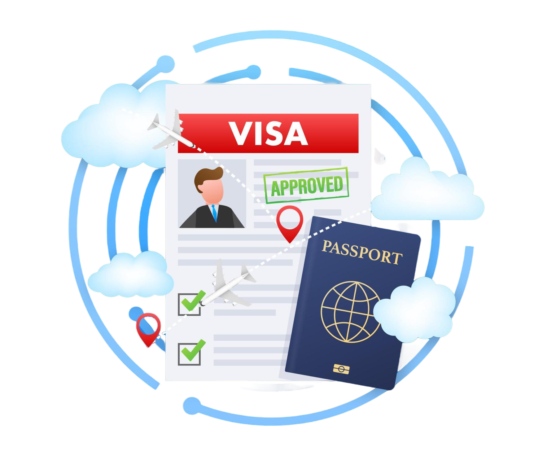Visa
A visa permits entry into a country, specifying the purpose, duration, and conditions of stay.
A visa is an official document issued by a country's government, granting permission for entry, stay, or residency within its borders. It delineates the traveler's purpose, duration of stay, and any specific conditions or restrictions. Visa vary based on the intended activities: tourist, work, study, or permanent residence. They often necessitate an application process involving documentation, such as passports, photographs, financial proofs, and sometimes interviews or biometric data.
Different types of visa exist, such as single-entry, multiple-entry, or transit visa, each serving distinct travel purposes. Visa regulations differ among countries and are subject to change, impacting travel plans significantly. Compliance with visa requirements is crucial to ensure lawful entry into a country and adherence to its laws during the stay, affecting everything from short visits to long-term relocations or study abroad experiences

A student visa permits international students to study in a specific country for an allotted duration.
A student visa is a document issued by a country's government to allow foreign students to study within its borders. It's tailored for educational purposes, permitting entry and outlining the duration and terms of study. The application process typically requires an acceptance letter from a recognized educational institution, proof of financial support, medical examinations, and sometimes evidence of language proficiency. Student visa come with regulations, often restricting work hours or specifying a need for academic progress.
They can range from short-term study programs to long-term degrees. These visa are essential for legal enrollment in educational institutions abroad, ensuring compliance with local immigration laws and facilitating access to educational resources and opportunities in the host country. Maintaining valid student status is crucial, and often, extensions or changes in visa are required for prolonged stays or transitions to other programs.

Skilled immigration involves relocating based on professional expertise and qualifications for specific job opportunities.
Skilled immigration refers to the process wherein individuals with specific expertise, qualifications, or professional backgrounds relocate to a different country for employment or residency. This immigration category prioritizes candidates with sought-after skills, usually aligning with the host country's labor market needs. It often involves points-based systems, assessing factors like education, work experience, language proficiency, and age.
Skilled immigrants contribute to the host country's workforce, bringing valuable expertise, filling critical job gaps, and enhancing economic growth and innovation. Many nations offer pathways for skilled immigrants, such as skilled worker programs, permanent residency, or work visa. These processes typically involve assessments, applications, and sometimes sponsorship by employers. Skilled immigration policies vary among countries and are subject to change based on economic demands, aiming to attract and retain talent to drive productivity and competitiveness in diverse industries.

Spouse/Family visa permit family members to join or stay with a relative in another country legally.
Spouse/Family visa are granted by countries to facilitate family reunification, allowing spouses, children, or dependents of residents or citizens to legally join or remain with their family member in a foreign country. These visa enable individuals to reside, work, or study in the host country based on their family ties. The application process often requires proof of relationship, financial support, medical examinations, and adherence to specific requirements set by immigration authorities.
These visa may offer varying rights, such as employment or access to public services, depending on the host country's regulations. They aim to maintain family unity, supporting the integration of families and promoting emotional, social, and economic stability for individuals living away from their home country. Requirements and eligibility criteria for such visa can differ significantly among nations, impacting the reunification process.

Tourist & Visitor visa permit individuals to visit a country for leisure, tourism, or short-term stays.
Tourist and Visitor visa are documents issued by countries to allow individuals to enter for temporary stays, typically for tourism, visiting family or friends, or participating in short-term activities. These visa outline specific periods for entry, duration of stay, and limitations on activities permissible during the visit. The application process often involves providing details of accommodation, travel itinerary, financial solvency, and a demonstration of intent to return to one's home country after the visit.
These visa may have single or multiple entries, allowing individuals to enter the country once or multiple times within a specified period. They facilitate international travel for leisure, cultural exchanges, or attending events, festivals, or conferences, supporting global tourism and fostering cross-cultural interactions. Requirements and conditions for tourist and visitor visa vary among countries and are subject to the respective country's immigration regulations and policies.

Business immigration involves relocating for work, investment, or entrepreneurship opportunities in another country.
Business immigration refers to the process where individuals relocate to another country for business-related purposes. This category includes entrepreneurs, investors, executives, and professionals seeking opportunities, expanding their enterprises, or establishing new businesses abroad. It often involves specific visa or residency programs designed for businesspersons, offering pathways for investment, starting companies, or contributing to the host country's economy.
Business immigrants may bring substantial investments, innovative ideas, and job opportunities, benefiting the local economy. They contribute to economic growth, technological advancements, and cultural diversity, fostering global partnerships and exchanges. These programs usually entail demonstrating business plans, financial capabilities, job creation potential, or meeting certain investment thresholds. Business immigration policies vary among countries, with some nations actively promoting and facilitating such immigration to stimulate economic development and innovation in various sectors.

Resident Return Visa allow former residents to return and maintain their residency status in a country.
Resident Return Visa (RRVs) are documents allowing former residents or citizens of a country to return and maintain their residency status. These visa are often essential for individuals who have previously held residency but departed and need to re-enter to retain or resume their residency rights. RRVs usually have conditions related to the duration of absence and ties to the country, ensuring a continued connection despite living abroad.
The application process may require demonstrating substantial ties, such as property ownership, employment, family connections, or compelling reasons for the extended absence. RRVs play a crucial role in enabling individuals to preserve their residency rights and continue their lives in their home country or regain residency status after an extended stay abroad. The criteria and validity periods for RRVs vary among countries, and compliance with regulations is vital for maintaining residency privileges.
